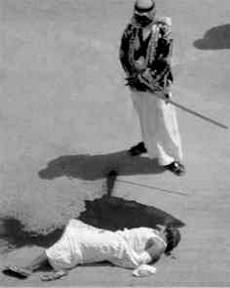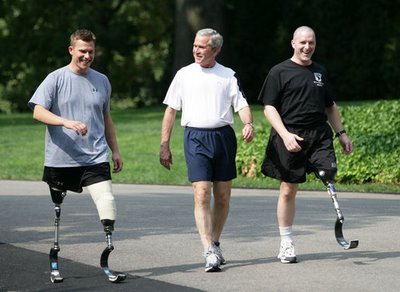Our shared dictators.
Surprisingly little attention has been paid to the death of another sadly missed anti-communist dictator, or as they're glibly known, some of Margaret Thatcher's closest friends.
Like Pinochet, who popped his clogs in late 2006 and never faced justice, Suharto has gone to his grave without having to so much as atone for a single drop of blood that was spilt during his reign of terror, which encompassed the massacre of hundreds of thousands of alleged communists (i.e. what our leaders referred to when talking of Saddam Hussein's mass killings, for example, as "his own people"), with a list of targets willingly supplied by the Central Intelligence Agency, while the people of East Timor were twice menaced by Indonesian troops. By "menaced" I mean butchered and annihilated to such an extent that out of a population of 700,000, somewhere in the region of 100,000 to 200,000 were killed.
All of this happily occurred while we turned a blind eye, oh, and sold Suharto a shedload of weapons courtesy of British Aerospace, now BAE Systems. To be fair to dear old Margaret, this happened under both Labour and Conservative governments, just as New Labour has continued to arm such darlings of democracy as Saudi Arabia, even allowing the princes of that most enlightened country to use the services of prostitutes out of BAE's slush fund. It does however bring it all into perspective though, doesn't it? After all, I don't recall the current leaders of Iran being complicit in the slaughter of hundreds of thousands of their own people, or invading other countries and murdering up to around 25% of the population. Indeed, Iraq invaded Iran while we were selling Iraq what would later become known as the weapons of mass destruction, although the United States via funding the Contras in Nicaragua also funnelled money and weapons to the Iranians, despite the embarrassment of the overthrow of the Shah and the hostage situation at the American embassy which dragged on for over a year.
Confused? You should be. At least we know now who our friends are, that our values are shared, and that there won't be a return to the realpolitik and cold war diplomacy that now so scars our conscience concerning the three decades that preceded the "end of history". As for the enemy, well, we're still not exactly sure who they are either, although they too once might have been our friends. There is however a certain irony when you recall Marx's statement that history is repeated first as farce and then as tragedy, especially when examining the comments of the current American ambassador to Indonesia:
Like Pinochet, who popped his clogs in late 2006 and never faced justice, Suharto has gone to his grave without having to so much as atone for a single drop of blood that was spilt during his reign of terror, which encompassed the massacre of hundreds of thousands of alleged communists (i.e. what our leaders referred to when talking of Saddam Hussein's mass killings, for example, as "his own people"), with a list of targets willingly supplied by the Central Intelligence Agency, while the people of East Timor were twice menaced by Indonesian troops. By "menaced" I mean butchered and annihilated to such an extent that out of a population of 700,000, somewhere in the region of 100,000 to 200,000 were killed.
All of this happily occurred while we turned a blind eye, oh, and sold Suharto a shedload of weapons courtesy of British Aerospace, now BAE Systems. To be fair to dear old Margaret, this happened under both Labour and Conservative governments, just as New Labour has continued to arm such darlings of democracy as Saudi Arabia, even allowing the princes of that most enlightened country to use the services of prostitutes out of BAE's slush fund. It does however bring it all into perspective though, doesn't it? After all, I don't recall the current leaders of Iran being complicit in the slaughter of hundreds of thousands of their own people, or invading other countries and murdering up to around 25% of the population. Indeed, Iraq invaded Iran while we were selling Iraq what would later become known as the weapons of mass destruction, although the United States via funding the Contras in Nicaragua also funnelled money and weapons to the Iranians, despite the embarrassment of the overthrow of the Shah and the hostage situation at the American embassy which dragged on for over a year.
Confused? You should be. At least we know now who our friends are, that our values are shared, and that there won't be a return to the realpolitik and cold war diplomacy that now so scars our conscience concerning the three decades that preceded the "end of history". As for the enemy, well, we're still not exactly sure who they are either, although they too once might have been our friends. There is however a certain irony when you recall Marx's statement that history is repeated first as farce and then as tragedy, especially when examining the comments of the current American ambassador to Indonesia:
The US ambassador to Jakarta, Cameron Hume, hailed Suharto as a "historic figure" who "achieved remarkable economic development", while adding that there "may be some controversy over his legacy".
Labels: cold war reminiscing, foreign policy, realpolitik, shared values, Suharto



